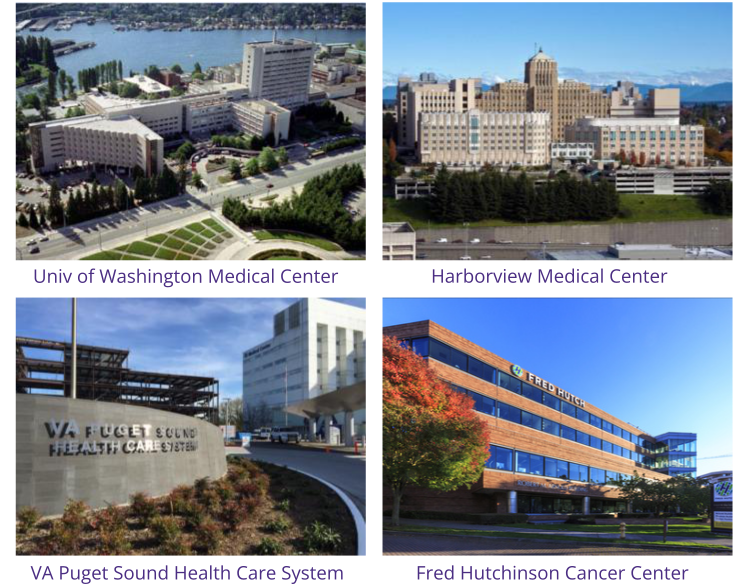As part of WWAMI (Washington, Wyoming, Alaska, Montana and Idaho), we care for a diverse catchment of patients across the Pacific Northwest. Seattle is home to a vibrant and diverse population and our multi-center experience provides breadth and depth of clinical training experience including everything from transplant to cutting edge cancer therapies and global health.
Locations
Located throughout Seattle, our fellows train at several different medical centers: University of Washington Medical Center (UWMC Montlake and Northwest), Harborview Medical Center (HMC), Veterans Affairs Puget Sound Health Care System (VAPSHC), and the Fred Hutchinson Cancer Center.

Pulmonary Medicine
In addition to inpatient pulmonary consultation at UWMC, HMC, and the VA, fellows participate in all aspects of pulmonary medicine through ambulatory rotations in:
- General pulmonary clinic
- Asthma and allergy
- Chest radiology
- Cystic fibrosis (supported by the CF Research Development Program since 1989)
- Interstitial lung disease (Pulmonary Fibrosis Foundation Care Center Network site)
- Lung transplantation
- Neuromuscular disease
- Otolaryngology
- Pulmonary vascular disease (Pulmonary Hypertension Association accredited program)
- Sleep medicine
- Tuberculosis
- Thoracic surgery
Critical Care Medicine
Fellows are the team leaders in all of our intensive care units (ICUs) where they learn the full spectrum of critical care and multidisciplinary team management:
- Medical ICU (UWMC, HMC, VAPSHC)
- Oncology/Bone Marrow Transplantation ICU (UWMC)
- Surgical ICU (UWMC)
- Trauma ICU (HMC)
- Neurocritical Care ICU (HMC)
- Extracorporeal Life Support
In addition, there are opportunities to rotate through the Cardiac Critical Care Unit (CICU) and Cardiothoracic ICU (CTICU) at UWMC.
Continuity Clinic
Fellows will have a General Pulmonary continuity clinic at UWMC, HMC, or the VA. In their third-year, fellows may choose to alternate this clinic with a subspecialty clinic of their choice based on their clinical and/or research interests.
Skills/Procedures
Skills-based education is incorporated into rotations and mini-sabbatical sessions and there is ample opportunity to gain competence in all standard pulmonary and critical care procedures:
- Airway management, including a one month OR airway rotation early in the first-year
- Bronchoscopy, including endobronchial/transbronchial biopsies, navigational bronchoscopy, endobronchial ultrasound
- Diagnostic and procedural ultrasonography (PoCUS)
- Extracorporeal life support
- Pleural procedures
- Right heart catheterization
- Ventilator management
- Crisis leadership training
Sample Track Schedules
Physician-Scientist (seeking Masters)
Year 1
- Pulmonary (5 months)
- ICU (7 months)
Year 2
- Pulmonary (2 months)
- Research (10 months)
Year 3
- Pulmonary (2 months)
- Ambulatory (2 months)
- Research (8 months)
Physician-Scientist (no additional degree)
Year 1
- Pulmonary (5 months)
- ICU (7 months)
Year 2
- Pulmonary (2 months)
- ICU (1 month)
- Ambulatory (2 months)
- Research (6 months)
Year 3
- Research (12 months)
Clinician-Educator
Year 1
- Pulmonary (5 months)
- ICU (7 months)
Year 2
- Pulmonary (2 months)
- ICU (1 month)
- Scholarly time (9 months)
Year 3
- Pulmonary (4 months)
- ICU (2 months)
- Ambulatory (2 months)
- Scholarly time/Electives (4 months)
Clinical
Year 1
- Pulmonary (5 months)
- ICU (7 months)
Year 2
- Pulmonary (6 months)
- ICU (2 months)
- Ambulatory (1 month)
- Elective (3 months)
Year 3
- Pulmonary (4 months)
- ICU (2 months)
- Ambulatory (2 months)
- Elective (4 months)
* 4 weeks of vacation per year in 1-week blocks



